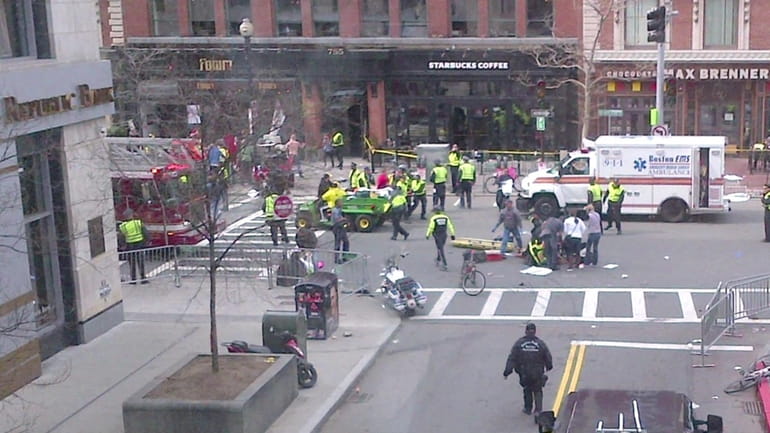Boston Marathon bombing coverage: What did the TV networks learn? Anything?

Emergency crews respond to the scene near the Boston Marathon explosion. (April 13, 2013) Credit: CNN
It may have taken a weekend to process, but April 19 does now appear to have been the most dramatic day for network television news since Katrina's destruction of New Orleans. It was a roaring blast of images, facts, speculation, gossip, dead-ends, loose ends, wild conjecture, ferocious street reporting, and, at moments, a wild throw-caution-to-the-wind melee that had news crews rushing to the source of gunshots only to find themselves down another blind alley - since Katrina, which was a much bigger and more complex story, by the way.
Then it was all over, just before 7, when Dzhokhar Tsarnaev was cornered.
But really, it was just beginning. A period of introspection for an industry that's not particularly good at the introspection game. Mistakes were made, big ones, but rather than concentrate on those -- been plenty of press on those already -- let's take a quick look at what did work, and how that might result in a calmer, saner, more fact-based approach to huge breaking news stories in the future.
.?.?. that the Big Three (CBS News, NBC News and ABC News) did in fact get the story right that no suspect had been arrested. Yeah, while CNN and Fox - meekly in the latter's case - were charging out the door with reports of an arrest, the other guys said "not so fast." Why did they get it right? Because they relied on the official channels of information, via the Justice Department or FBI. There's a natural tendency for reporters to scorn official channels, but in the case of a story this big, and with something that could conceivably impact public safety - they were the only sources to go. If they said "no arrest," then "no arrest." What would possibly be in their interest to equivocate? When John King said he had a reliable source -- and he said he had more than one, but truly, it was one person who gave him the green light -- all he had to do was then get a denial from the official channels and report that as well. His story would have been couched thusly: "We have one source telling us about an arrest, but officials say there has been none. So we have to proceed cautiously here .?.?."
.?.?. that bigfooting is a distraction that adds nothing. This is the process of sending a major anchor into the field to basically prove how beautiful he or she looks on camera, in the field, particularly when clad in an off-the-rack Burberry raincoat. In fact there was little of that.
.?.?. that sometimes studio analysis -- versus street reporting -- is the most productive form of reporting, so to speak, when no one on the street knows anything. CBS News framed its coverage this way, and to great effect. CBS took in the view from 30,000 feet, and there was plenty to see from there -- notably how law enforcement was possibly putting together leads and how those were being parsed .?.?. CBS had an advantage here -- John Miller, a former FBI official who added a wealth of perspective that pushed CBS before the pack, when the rest of the pack was squabbling over what they saw or think they saw in the streets of Watertown.
.?.?. that there's no shame in saying "We don't know." In fact, that became CNN’s default phrase after the King debacle, though somehow throughout the early morning hours Friday, CNN's Jake Tapper still managed to say that in a hundred elegant, and (yes) even informative ways.?
... that the networks ignore local sources of information -- most notably local TV station newscasts -- at their own peril. I bring this up last because it was a singular failing of the networks throughout this entire story. For the most part, they ignored local TV -- protective of their own turf, or perhaps afraid to reveal to national audiences that they were really flying blind when the local guys had the story cold. This was especially evident late Friday, when the networks -- all of them -- were clearly lost at sea in Watertown, while local Boston stations were reporting on the chopper as it tracked body movement inside the boat, saying that that was conclusively the suspect. The networks --seriously -- didn't even have the boat or any boat on TV at all. Some analysts were still trying to determine where the gunshots came from. To watch both network and local news simultaneously, was a study in contrasts, the contrast being that the majors were clueless. Boston, by the way, has some of the best local TV news operations in the country. Why ignore them during a story in their backyard? The major networks learned the hard way why they shouldn't.
